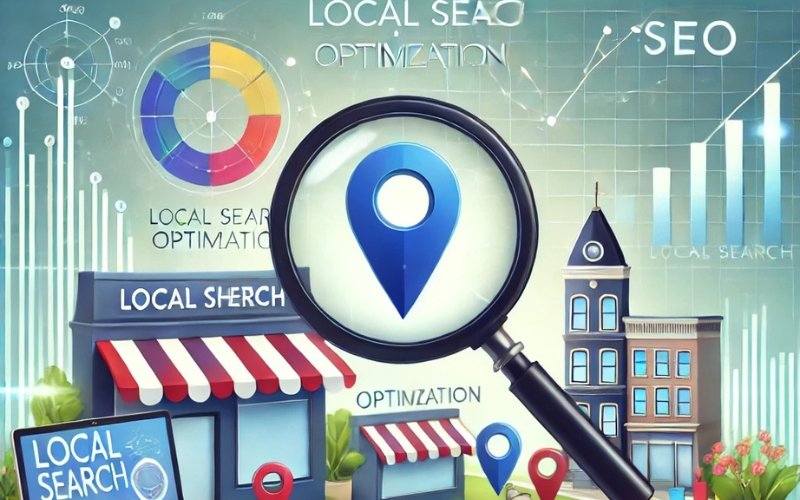Local SEO is an essential component of any SEO strategy, especially for small businesses and startups that rely on attracting customers from a specific geographical area. To Optimize for Local SEO, businesses must ensure their online presence aligns with local search intent. Optimizing for local search ensures that your business appears in search engine results when potential customers are searching for products or services “near me” or in your location. By focusing on how to Optimize for Local SEO, you can enhance your visibility and stand out among competitors in your area.
Whether you run a brick-and-mortar store or provide services within a specific region, local SEO can help you connect with nearby customers, drive traffic, and boost sales. Implementing the right tactics to Optimize for Local SEO ensures your business becomes more accessible to those actively looking for your offerings.
In this article, we will cover the key components of local SEO, why it’s essential for small businesses, and how you can effectively Optimize for Local SEO strategies to enhance your visibility. By following these guidelines, you’ll better understand how to Optimize for Local SEO and achieve sustainable growth in your target market
Why Local SEO Matters for Small Businesses

Local SEO focuses on optimizing your online presence so that your business appears in local search results when people in your area are searching for products or services like yours. Local searches are incredibly valuable for small businesses because they often have high conversion rates. To Optimize for Local SEO, you need to ensure your business details are accurate and consistent across directories. According to Google, 76% of people who conduct a local search visit a business within 24 hours, and 28% of those searches result in a purchase.
For startups and small businesses with limited marketing budgets, it’s important to Optimize for Local SEO to connect with nearby customers ready to make a purchase. By targeting specific geographical areas, you can Optimize for Local SEO and stand out from competitors. This strategy helps small businesses efficiently Optimize for Local SEO while driving conversions locally.
Claim and Optimize Your Google My Business Profile

One of the first steps to Optimize for Local SEO is to claim and optimize your Google My Business (GMB) profile. Google My Business is a free tool that allows businesses to manage their online presence across Google Search and Maps. When someone searches for your business or a service you provide, your GMB profile appears in the local search results, providing essential information such as your business name, address, phone number, hours of operation, and reviews.
To Optimize for Local SEO, start by claiming your GMB listing through the Google My Business website and following the steps to verify your business. Once you’ve claimed your profile, ensure that all information is accurate and up to date. This includes your NAP (name, address, and phone number), business hours, and categories.
In addition to basic details, you can further Optimize for Local SEO by:
- Adding high-quality photos of your business location, products, or services to give potential customers a sense of what you offer.
- Regularly updating your posts to highlight promotions, events, or new offerings.
- Responding to customer reviews, both positive and negative, to show that you value customer feedback and are engaged with your audience.
A well-maintained GMB profile is crucial to Optimize for Local SEO because it significantly improves your chances of appearing in the “local pack,” which is the group of three businesses that Google highlights at the top of local search results. Regular updates and accurate information help you stand out and further Optimize for Local SEO efforts, attracting more customers to your business.
Ensure Consistency in Your NAP Information
Consistency in your NAP (name, address, and phone number) information is crucial to Optimize for Local SEO success. Your NAP details should be the same across all online platforms, including your website, Google My Business profile, social media pages, and local directories. Inconsistent NAP information can confuse search engines and users, leading to lower rankings and potential customers losing trust in your business. To effectively Optimize for Local SEO, ensure your NAP information is accurate and aligned everywhere.
If you change your business name, move to a new location, or update your contact information, make sure to update all online listings as soon as possible. This step is vital to Optimize for Local SEO and maintain your business’s online visibility. Tools like Moz Local or BrightLocal can help you manage and monitor your local listings to ensure consistency across the web. These tools play a key role when aiming to Optimize for Local SEO effectively.
By focusing on NAP consistency, you can Optimize for Local SEO and improve your business’s ranking, attracting more local customers. Regular audits of your listings will also help you continually Optimize for Local SEO, ensuring your business stays competitive in local search result.
Optimize for Local Keywords

Keyword research is an important part of any SEO strategy, and when it comes to local SEO, it’s essential to incorporate location-specific keywords into your content. These keywords help search engines understand the geographical focus of your business and ensure that your website appears in relevant local searches.
For example, if you own a bakery in Austin, Texas, you should optimize your website for keywords like “best bakery in Austin,” “Austin custom cakes,” or “local bakery near me.” These local keywords can be incorporated into your website’s meta titles, descriptions, headers, and throughout your content.
In addition to using location-based keywords, it’s also important to include your business’s address and contact information on your website, particularly on your homepage, about page, and contact page. This not only helps search engines but also makes it easy for potential customers to find your business.
Build Local Citations and Listings
Local citations are online mentions of your business’s NAP information on other websites, such as local directories, review sites, and industry-specific platforms. These citations help boost your local SEO by validating the existence and legitimacy of your business to search engines.
There are two main types of citations:
- Structured citations: Appear on business directories like Yelp, Yellow Pages, or TripAdvisor, where your business information is listed in a structured format.
- Unstructured citations: Appear on websites like blogs, news articles, or social media pages, where your business may be mentioned in the context of an article or post.
Building local citations involves submitting your business to local and niche directories relevant to your industry. This not only helps improve your visibility in local searches but also strengthens your online authority. Keep in mind that the quality and relevance of these directories matter, so focus on reputable platforms that cater to your region or industry.
Encourage and Manage Online Reviews
Customer reviews play a significant role in local SEO, as they build trust with potential customers and signal to search engines that your business is reputable. Positive reviews can improve your local rankings and increase your chances of appearing in the local pack.
Encourage satisfied customers to leave reviews on your Google My Business profile, as well as other review platforms like Yelp, Facebook, or TripAdvisor. You can ask for reviews in person, include a request in your follow-up emails, or offer incentives for leaving feedback (e.g., a discount on future purchases).
Managing reviews is just as important as collecting them. Respond to all reviews—positive and negative—in a professional and timely manner. Address any concerns raised by customers and thank them for their feedback. Engaging with reviews demonstrates that you care about customer satisfaction and can positively influence how potential customers perceive your business.
Use Local Schema Markup
Schema markup is a type of structured data that helps search engines better understand the content on your website. By adding local schema markup to your website’s code, you can provide search engines with specific information about your business, such as your location, services, hours of operation, and reviews.
Local schema markup can improve your chances of appearing in rich snippets (enhanced search results that provide additional information) and increase your visibility in local searches. Tools like Google’s Structured Data Markup Helper make it easy to implement schema markup, even for those with limited technical experience.
Conclusion
By optimizing for local SEO, small businesses and startups can improve their visibility, attract local customers, and compete more effectively in their area. By focusing on strategies like optimizing your Google My Business profile, building local citations, and incorporating local keywords, you can ensure that your business is easily found by those in your community who are searching for the products and services you offer.

